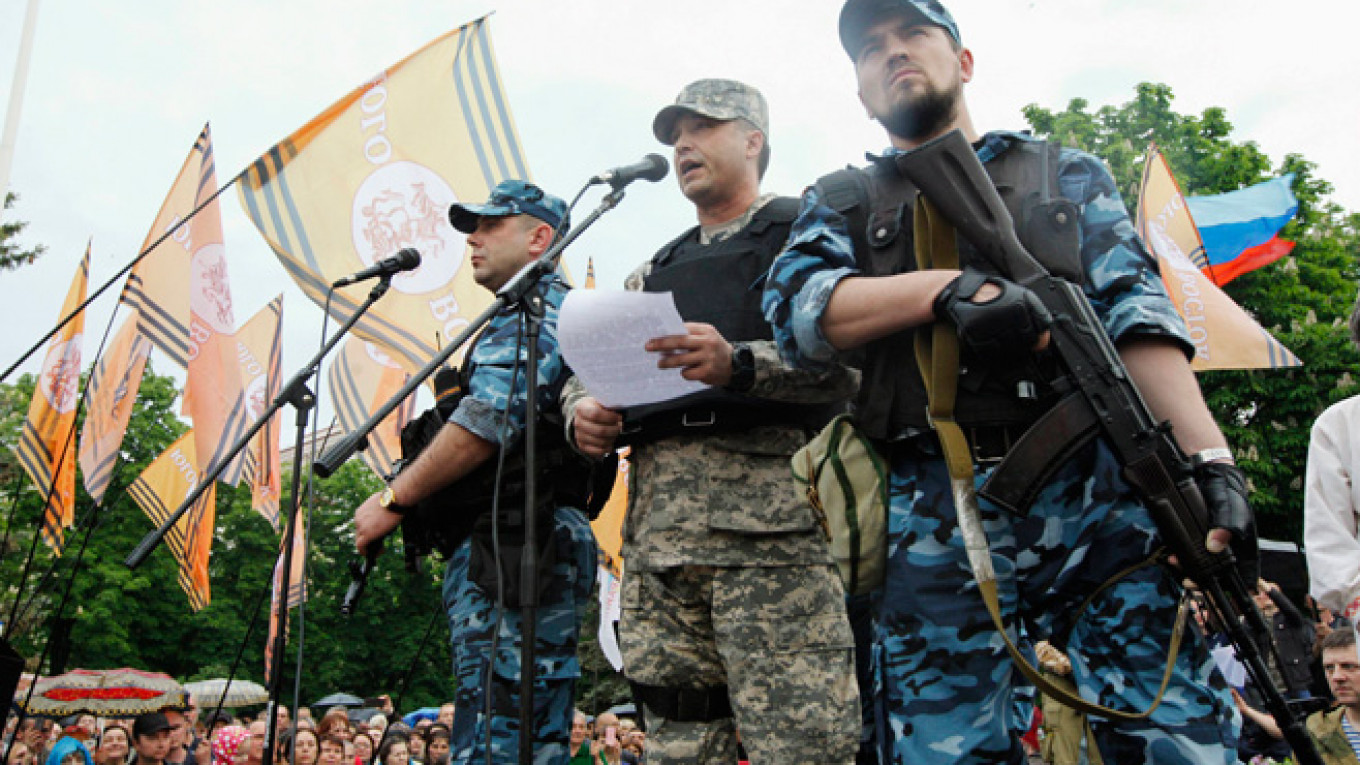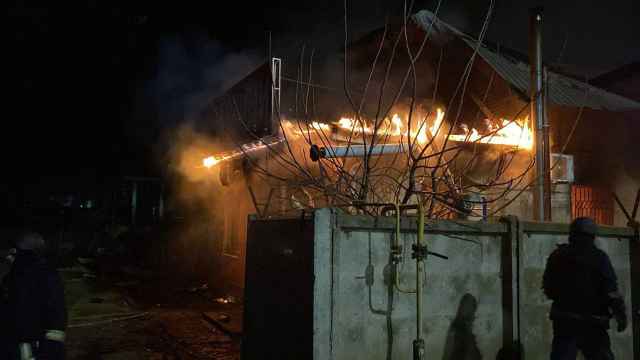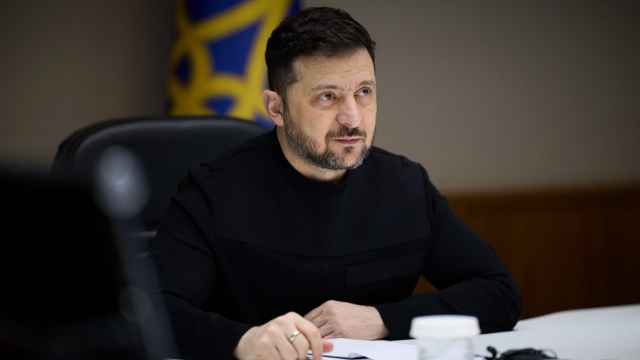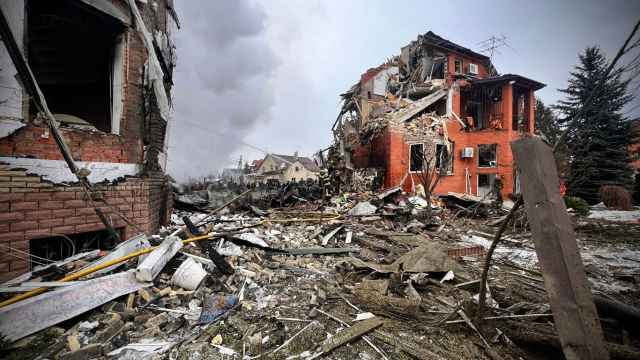In a normal situation, a Santa-for-hire, a Russian civil war romantic, a soapmaker and a financial pyramid organizer would probably not have much in common.
But in today's conflict-ridden Ukraine, these are the kinds of people building the separatist Donetsk People's Republic in the country's east, where they claim to run cities, armies, governments and elections.
While Ukrainian and Western governments have repeatedly accused these self-proclaimed authorities of being on Russia's payroll, it seems that Pavel Gubarev, Igor Strelkov, Vyacheslav Ponomaryov and Denis Pushilin are driven more by a thirst for adventure and a desire to be part of history than anything else.
For most of them, the ongoing military conflict between the makeshift Donetsk and Luhansk regiments and forces sent by central authorities in Kiev provides the former, but for some participating in such events has become a certain way of life.
Igor Strelkov, 43, commander of the Donetsk rebel forces, has been the most mysterious of all the figures who have been thrust into the spotlight as separatist leaders.
The Anonymous International hacker group on Monday published what it said were Strelkov's personal e-mails, which reveal that Strelkov has an extensive resume of participation in military conflicts. According to the e-mails, he participated in military conflicts in the self-proclaimed Transdnestr republic in 1992, in Bosnia in 1993 and in Chechnya from 1995.
From 1996 until March 2014, Moscow-born Strelkov, whose real name is Igor Girkin, served in the Federal Security Service, including in Chechnya in 1999 to 2005. Before the Crimean annexation in March, Strelkov had been advising Crimea's head, Sergei Aksyonov, on security issues.
When reached via e-mail and phone, a man the hacker group identified as Strelkov refused to confirm the allegations and his identity. But Vyacheslav Ponomaryov, the people's mayor of Slovyansk — who said he was an old friend of Strelkov — said the claims were true, and offered to set up an interview with Strelkov "depending on what the separatists would get in return."
He suggested money, clothing or medications — "we are short on everything," he said — to seal the deal for an interview, but did not specify an exact sum.
Speaking with The Moscow Times, a member of the hacker group said that Strelkov was also connected to the Abkhazian Network News Agency, or ANNA, which has covered Syria's civil war from the frontlines.
See related story:
According to the e-mails purported to be Strelkov's, he previously worked with the news agency's head, Marat Musin, in recruiting Russians to work as armed guards for Syria's energy assets.
The ANNA agency is also active in Ukraine today, where it runs a heavily pro-separatist news agency.
At the time of its Syria coverage in March 2013, Musin told The Moscow Times that the agency's work was not supported by the Russian government and was being conducted with the help of Russian businessmen.
On Thursday, Ponomaryov, 49, said that it was he who invited Strelkov from Crimea to manage the armed resistance in Donetsk.
"We rely on a network of good friends from all over the former Soviet Union," he said by phone from Slovyansk.
"I invited Strelkov and some of my other friends to kick these fascists out to where they were trained in Estonia and Poland. Let them learn European values over there," he said.
Before getting involved in the uprising in eastern Ukraine, Ponomaryov was involved in various enterprises in Slovyansk, including soap and clothing factories.
As a businessman, he earned "a considerable sum of money" that was "all spent on the referendum," he said.
But if his background seems incongruous with his current activities, that of Pavel Gubarev, the people's governor of the Donetsk region, is even more mind-boggling.
Gubarev, 31, gained recognition after he was detained by Ukraine's security services and freed in May in exchange for SBU officers.
Prior to that, however, Gubarev was a Santa-for-hire. He has been involved in a promotions and events business in Donetsk since the mid-2000s. A website of his events company still features him in a Santa-for-hire role with prices running as low as 500 hryvnas ($43) for a 40-minute performance.
Following his release from Ukraine's security services, Gubarev has been undergoing medical treatment in Donetsk, and thus was unable to give an interview.
During the time that Gubarev was in detention in Kiev, Denis Pushilin, 33, appeared on the scene, claiming he would be Gubarev's deputy. Since then, he has chaired the government of the self-proclaimed republic and served as its main public speaker, declaring the region's independence following the recent referendum.
Before the referendum, Pushilin ran the Ukrainian branch of the MMM company — known for perpetrating one of the largest Ponzi schemes of all time, which affected thousands of people.
The scheme was organized by Sergei Mavrodi, who was sentenced by a Moscow court to 4 1/2 years in prison in 2007.
The only professional politician among the top-level self-proclaimed authorities of the Donetsk Republic is Roman Lyagin, the head of the central elections commission who organized and operated last Sunday's referendum.
"I am a professional political scientist, I ran many elections in many countries, including Russia," Lyagin said in a phone interview.
Lyagin said that the Donetsk People's Republic had been established as an underground society as far back as in 2006, and that the people who have come to the fore today go back a long time.
During his political career, Lyagin ran for mayor of Donetsk in 2006 and said he was going to run for mayor of Kiev in 2008, when he promised to destroy the city's main street, Khreschatyk, because it was lined with Stalinist buildings.
Contact the author at [email protected]
A Message from The Moscow Times:
Dear readers,
We are facing unprecedented challenges. Russia's Prosecutor General's Office has designated The Moscow Times as an "undesirable" organization, criminalizing our work and putting our staff at risk of prosecution. This follows our earlier unjust labeling as a "foreign agent."
These actions are direct attempts to silence independent journalism in Russia. The authorities claim our work "discredits the decisions of the Russian leadership." We see things differently: we strive to provide accurate, unbiased reporting on Russia.
We, the journalists of The Moscow Times, refuse to be silenced. But to continue our work, we need your help.
Your support, no matter how small, makes a world of difference. If you can, please support us monthly starting from just $2. It's quick to set up, and every contribution makes a significant impact.
By supporting The Moscow Times, you're defending open, independent journalism in the face of repression. Thank you for standing with us.
Remind me later.






